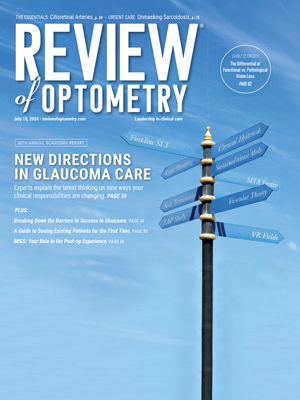 |
Ive always been fascinated with personality traits and how they affect our interactions and our personal or professional successes. Thats why I was completely knocked over when I read this months Retina Quiz, indicating that type-A individuals are at an increased risk of developing idiopathic central serous chorioretinopathy.
Now, I realize that Type-A individuals are typically more stressed than . . . well . . . me. Im also familiar with research that suggests that, as a result, these high-charged types are more prone to certain diseases. But, I never stopped to contemplate the extent to which personalities might predispose patients to vision problems and ocular disease. It got me thinking: In what other ways might psychology and optometry be connected?
In Glaucoma Grand Rounds, James Fanelli, O.D., details one example that may be familiar to all O.D.s. Namely, fighting a battle of wills with a head-strong patient over appropriate treatment or follow-up. As Dr. Fanellis case illustrates, you sometimes have to compromise your own beliefs or feed a patients misguided ego in the interests of preserving vision.
But, psychologys hold on optometry doesnt end with the dance between patient and doctor. On the contrary, it begins with whats inside your own head.
In a recent article published in Psychology Today, author Carlin Flora outlined four X-Factors that are common in the worlds most successful people:1
Charisma. When two people click, they unconsciously adjust their posture and speech rate to each other. Charismatic people, on the other hand, are natural attractors who get others to synchronize to them. Consider Oprah Winfrey who controls an audience with her keen sense of timing, repetition and rhythm. Charisma consists of components such as expressivity, sensitivity, control, eloquence, vision and self-confidence. The good news: By practicing communication techniques, you can get in touch with your inner Oprah, says Flora.
Chutzpah. Chutzpah is critical to fully delivering on your potential, says Solomon Snyder, director of the department of neuroscience at Johns Hopkins. It is a behavior that crosses a social norm, not merely to get away with something, but rather to purposefully challenge convention. It is social risk-taking. It is gumption. How can you make it your own? Publishing maven Judith Regan seems to have the answer: I have this incredible career. Ive had great love affairs. People look at me and ask, Why does this bitch have all this? she says. I have it because I went for it, and they are afraid.
Joie De Vivre. People with joie de vivre are like windup dolls that never run down, says Flora. They are passionate explorers who view their work as play. They are exuberant. Unfortunately, research shows that exuberance is something youre born with. These individuals reward systems function differently. Positive rewards like social interaction do more for [children with joie de vivre] than they do for others, says psychologist Nathan Fox. As a result, they are motivated not only to meet new people but to connect with them as well. Luckily, for the rest of us, we can cultivate the cousin of joie de vivrepositive thinking.
Grace. Rarely overwhelmed by their own feelings of discomfort, graceful individuals are said to have great poise and impeccable timing, allowing them to strike the right emotional chord. We catch glimpses of grace in characteristics such as wisdom, benevolence and equanimity. Since its presumed to spring from hard-won life experience, grace can be cultivated. Consider Nelson Mandela; Twenty- seven years in prison cultivated his legendary resolve, says Flora.
O.D.s deal with a wide range of personalities every day. But when all is said and done, the personality most critical to your success is your own. A little self-reflection can go a long way to making you a better doctor, business-owner, role-model, parent and spouse.
Flora C. The superpowers. Psychology Today 2005 May/June;38(3): 40-50.

